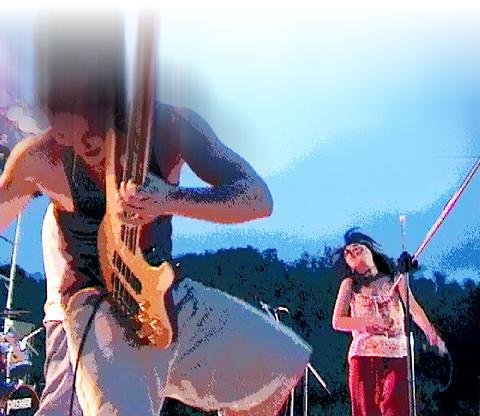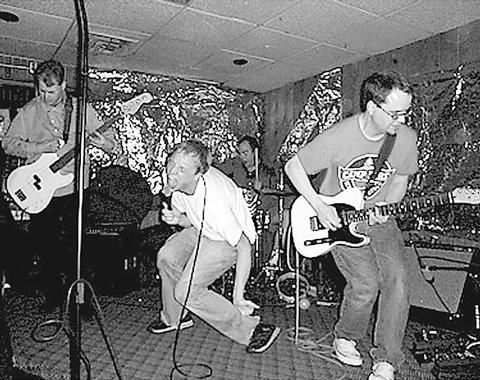"Spring Scream is completely independent. It doesn't really rely on anything commercial, so in the industry, we really respect it. I mean I can't talk for the whole industry, because not all the companies are into producing live performers, but for us, it's important."
Roger Lee (
The thing Lee's referring to, Spring Scream, is an annual music festival held near the beach town of Kenting in southern Taiwan. Last year, 160 bands played on its three stages, providing over 12 hours of music a day for four days straight. Next Thursday through Sunday, this will happen again as the festival reaches its eighth year, Spring Scream Horse.

PHOTOS COURTESY OF SPRING SCREAM AND :40 OF HELL
Lee continued: "Our company, we have a cycle every year where we take a break in the winter. People go home or take time off to write songs or whatever. And then, Spring Scream comes as kind of a wake-up call. For us, it's an extremely important event on our annual calendar. It's basically the start of our year."
And then, perhaps tangentially: "It's like a drug."
This year, Lee and Rock Records will send more than 30 people to Kenting for the music festival, which is Taiwan's biggest. "If we want to sign some new artists, it's a good chance to make a first contact. For example, two years ago was when we found MC Hot Dog. We'd never seen him before that."

MC Hot Dog was Taiwan's first home-bred rapper to blow up island wide. Last year he released four mini CDs which sold over 220,000 copies.
Though popular, MC Hot Dog is hardly the biggest act to come out of the anybody-can-do-it rock scene that Spring Scream tends to foster. The biggest would have to be Mayday, a poppy, rocky group of five Taiwanese kids that has now sold over one million CDs to their screaming, adoring Taiwanese fans.
Spring Scream co-organizer Jimi Moe can't clearly recall which year Mayday first played Spring Scream, but guesses it was 1996 or 1997. All he can say for sure about his early impressions of the band is: "I remember looking at a box of tissue paper that was also called Mayday and thinking, `Whoa, they have the same name as a box of tissue paper.'"
Mayday last played Spring Scream in 2000. Speaking for Rock Records, Lee said: "I can't say for sure that we `discovered' them at Spring Scream, but it definitely had a lot to do with our becoming aware of them."
In August 2001, Mayday did a mini-tour of Taiwan, playing three concerts that drew between 20,000 and 30,000 fans each. Crowds at last year's Spring Scream Snake, by comparison, topped out at around 3,000, according to the other half of its organizing team, Wade Davis (there are no official statistics for Spring Scream, but many feel the crowd could have been twice as large as Davis' estimate).
"If really big bands come, they'll attract too many people. Then Spring Scream would be like a sideline for Mayday and the whole thing would be ruined."
This comes from Randy Lin (
While producing a few bands of its own (the best known is probably LTK), much of Crystal's output comes from serving as a distribution channel for "unheard ofs," including small companies like Scum, organizations backing their way into music production like the Taiwan Rock Alliance, and self-produced albums by local bands.
The biggest selling albums Lin has ever produced -- eponymous releases by groups 1976 and Ladybug -- have only sold between 3,000 and 4,000 copies. That said, the Ladybug album (1997) stands as one of the most seminal works ever recorded in Taiwan's non-mainstream rock scene. Other bands for which Lin has produced debut albums include Groupie, Sugarplum Fairy, Psychedelic Kindergarten and The Stop, Look, Listen. All of these bands have played Spring Scream at one time or another.
But none of them will appear this year. Lin: "Some have broken up or have other problems, and some well, now they have some history and have played Spring Scream several times. Plus, there are so many new bands. They've just done it already and don't necessarily need to go back every year."
Lin's first Spring Scream was the second, Spring Scream Rat, in 1996. He'd heard about the concert, which in its first year drew around 300 people, from friends in Ladybug, so he went down to set up a booth and sell CDs.
At that time, there weren't many places anywhere in Taiwan to find out about bands. Taipei only had a couple of hole-in-the-wall clubs. There was also the Taiwan Rock Festival (
Though Formoz managed to bring huge international acts like Megadeth, Biohazard and Yo La Tengo last summer for Taiwan's first attempt at a mega-concert, it was virtually unknown in its first few years. The festival was introduced the same year as the first Spring Scream, 1995, but was organized by university rock clubs which, for the first few years, didn't keep either the location or the date consistent.
Moreover, Lin remembers, "Spring Scream was like a party, the Taiwan Rock Festival was like a concert."
He went on to say how Spring Scream had that "all-my-friends-are-here" kind of feeling, something that many old schoolers in the Taipei rock clique say it's lost as it's gotten bigger and put on weight.
"Some people say it really sucks now, but it doesn't really suck. And some people say it's really awesome, but it isn't really awesome either. Now it's just that you definitely go every year," said Joyce Cheng (
Lin said he will take a break from the concert this year. Yet like Huang, he described something of a necessity in the Spring Scream pilgrimage, especially for Taiwan's young rockers: "It's symbolic as in the bands and the fans who like this type of music, they all have to say they've been there.
But beyond Spring Scream's not being new anymore, the concert remains a motivating factor for many, because it offers a deadline. According to Doris Yeh (
Some of these "beginner bands" are even coming out of big labels like Magic Stone. This year the company is sending Dog G (
According to Lee, throwing out new acts at Spring Scream has practically become policy: "We send some artists every year. It just depends on who we want to promote and who's on the right scale. It's a good chance to let a lot of people see them."

On April 26, The Lancet published a letter from two doctors at Taichung-based China Medical University Hospital (CMUH) warning that “Taiwan’s Health Care System is on the Brink of Collapse.” The authors said that “Years of policy inaction and mismanagement of resources have led to the National Health Insurance system operating under unsustainable conditions.” The pushback was immediate. Errors in the paper were quickly identified and publicized, to discredit the authors (the hospital apologized). CNA reported that CMUH said the letter described Taiwan in 2021 as having 62 nurses per 10,000 people, when the correct number was 78 nurses per 10,000

As we live longer, our risk of cognitive impairment is increasing. How can we delay the onset of symptoms? Do we have to give up every indulgence or can small changes make a difference? We asked neurologists for tips on how to keep our brains healthy for life. TAKE CARE OF YOUR HEALTH “All of the sensible things that apply to bodily health apply to brain health,” says Suzanne O’Sullivan, a consultant in neurology at the National Hospital for Neurology and Neurosurgery in London, and the author of The Age of Diagnosis. “When you’re 20, you can get away with absolute

May 5 to May 11 What started out as friction between Taiwanese students at Taichung First High School and a Japanese head cook escalated dramatically over the first two weeks of May 1927. It began on April 30 when the cook’s wife knew that lotus starch used in that night’s dinner had rat feces in it, but failed to inform staff until the meal was already prepared. The students believed that her silence was intentional, and filed a complaint. The school’s Japanese administrators sided with the cook’s family, dismissing the students as troublemakers and clamping down on their freedoms — with

As Donald Trump’s executive order in March led to the shuttering of Voice of America (VOA) — the global broadcaster whose roots date back to the fight against Nazi propaganda — he quickly attracted support from figures not used to aligning themselves with any US administration. Trump had ordered the US Agency for Global Media, the federal agency that funds VOA and other groups promoting independent journalism overseas, to be “eliminated to the maximum extent consistent with applicable law.” The decision suddenly halted programming in 49 languages to more than 425 million people. In Moscow, Margarita Simonyan, the hardline editor-in-chief of the